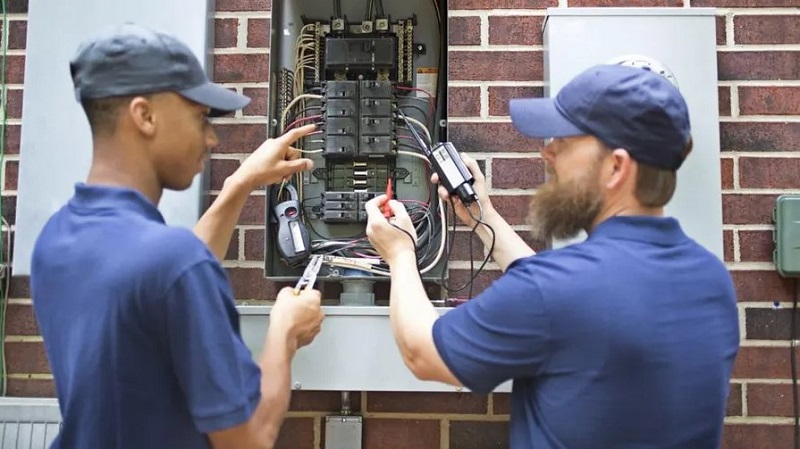Have you ever considered a career as an electrician? With the increasing demand for skilled tradespeople, becoming an electrician can be both rewarding and lucrative. In this post, we’ll break down everything you need to know about entering this exciting field – from education and training requirements to the skills you will need to succeed.
How To Become An Electrician: 9 Steps to Take
To become an electrician, you need to understand the education and training requirements, research apprenticeship programs and on-the-job training, comprehend licensure and certification requirements, and identify continuing education and training opportunities.
1. Understand The Education And Training Requirements
To embark on a journey to become an electrician, understanding the education and training requirements is crucial. Typically, aspiring electricians start by obtaining a high school diploma or GED, with courses in algebra and physics providing a solid foundation for their future profession.
Subsequently, many decide to pursue further education at a community college or technical school offering specialized electrical training programs.
In addition to classroom learning, practical experience plays a pivotal role in shaping one’s expertise as an electrician. Most apprenticeship programs last 4-5 years and include extensive on-the-job training under the guidance of skilled professionals.
Trainees can expect to apply theoretical knowledge during these hands-on sessions while mastering key skills like troubleshooting issues and maintaining electrical systems effectively.
2. Research Apprenticeship Programs And On-the-Job Training
To become a skilled electrician, researching apprenticeship programs and on-the-job training is crucial. Apprenticeship programs provide individuals with hands-on experience while working alongside experienced professionals in the field.
On-the-job training is equally important as it allows beginners to gain hands-on work experience while earning a salary.
When searching for an apprenticeship program or on-the-job training opportunity, it’s essential to consider factors such as cost, location, and duration of the program.
A great advantage of these learning opportunities is that they offer participants real-world experiences that equip them with industry-specific knowledge, techniques, tools, safety procedures and codes needed to excel in their chosen career path.
3. Understand Licensure And Certification Requirements
Becoming a licensed electrician is crucial to a successful career in the field. Each state has its own specific requirements, so it’s important to research and understand the licensure process in your area.
Generally, you will need to complete an apprenticeship program or on-the-job training before taking the licensing exam.
Obtaining certification through organizations like the National Joint Apprenticeship and Training Committee (NJATC) can also boost your credentials and make you more competitive in job opportunities.
4. Identify Continuing Education And Training Opportunities
As an electrician, it’s crucial to stay up-to-date with the latest industry trends and regulations.
Fortunately, continuing education opportunities abound for practicing electricians. For instance, there are online courses that offer advanced-level instruction on topics like renewable energy or smart grids.
Additionally, professional associations such as the National Electrical Contractors Association (NECA) sponsor educational conferences throughout the year where attendees can learn about best practices in areas like energy efficiency or workplace safety.
Plus, many companies also offer ongoing training programs for staff to help keep up with ever-evolving technologies.
5. Technical Skills And Knowledge
Electricians require strong technical skills and knowledge to be successful in their field. They must have a deep understanding of electrical systems, circuits, wiring, and electrical codes.
Electricians use advanced tools such as voltmeters, ammeters, circuit tracers, and multimeters for troubleshooting work. Besides this, they also know how to read blueprints or other diagrams as well as interpret technical manuals related to their area of expertise.
This knowledge is gained through education and practical courses taken at community colleges or technical schools that provide the necessary classroom instruction in algebra and physics alongside on-the-job training during apprenticeships that help aspiring electricians get hands-on experience working with experienced professionals who can offer guidance along the way.
6. Physical Dexterity And Hand-Eye Coordination
Being an electrician requires a high level of physical dexterity and hand-eye coordination. From running wires through narrow spaces to manipulating small connectors, electricians need good motor skills to perform their job efficiently and safely.
In addition, electricians often work on elevated surfaces or in cramped areas where they have limited mobility, so it’s important for them to have strong balance and agility as well.
For example, when installing lighting fixtures or ceiling fans, they may need to stand on a ladder or scaffolding for extended periods of time.
7. Attention To Detail
Attention to detail is a crucial quality that every successful electrician must possess. As an electrician works with intricate electrical systems, even the slightest mistake can have significant consequences, including safety risks and equipment damage.
Being able to pay close attention to details such as wiring, circuit connections, and electrical codes helps ensure that everything operates safely and efficiently. For instance, an electrician who fails to properly connect wires in a circuit breaker could cause a potential short circuit or overload.
Moreover, attention to detail also applies when conducting diagnostic check-ups or troubleshooting faulty electrical systems. A skilled electrician should be able to identify even the smallest issues through careful observation of circuits’ behavior using various tools such as test meters and oscilloscopes accurately.
The ability to spot these problems early on can prevent serious damages down the line and save clients time and money while ensuring their safety.
8. Good Communication Skills
As with any profession, it is important to possess good communication skills as an electrician. Clear and effective communication ensures that the job is done right the first time around and minimizes costly mistakes.
Electricians must communicate effectively with their clients, providing clear explanations of what work needs to be done and why.
Good communication also plays an essential role when working in teams on larger projects. A breakdown in communication can lead to missed deadlines, unsafe work conditions, or even injuries.
Finally, good communication skills are essential for safety reasons because they help avoid misunderstandings that could result in accidents or injuries. For example, if someone does not understand electrical safety protocols correctly during a project, there could be fatal consequences.
9. Strong Work Ethic
A strong work ethic is crucial for anyone pursuing a career as an electrician. Electrical work can often be physically demanding and sometimes requires working in uncomfortable positions or environments.
Additionally, electricians often work on projects with tight deadlines or emergencies that require immediate attention. A strong work ethic ensures that they will stay focused, committed, and determined until the job is done right.
Mastering practical skills go hand-in-hand with developing a strong work ethic; To become successful at troubleshooting complex electrical systems and performing maintenance tasks at high levels of proficiency may necessitate honing your craft through hundreds — if not thousands — of hours of training.
Career Prospects And Opportunities For Electricians
Electricians have a wide range of career prospects and opportunities available, including working as residential or commercial electricians, industrial electricians, maintenance and repair electricians, specializing in certifications and even starting their own businesses.
Residential And Commercial Electricians
Residential and commercial electricians are the two most common types of electricians. Residential electricians primarily work on homes, apartments, and other residential structures.
They install wiring, outlets, switches, and lighting fixtures while following electrical codes to ensure safety. On the other hand, commercial electricians work in a range of settings such as schools, offices, and factories.
Their job involves installing electrical systems for new buildings or upgrading existing ones.
While there is some overlap between these two types of electricians in terms of skills required, there are unique challenges associated with each specialty area. Residential electricians must be comfortable working in tight spaces like attics or crawl spaces while commercial electricians often deal with complex wiring systems that require specialized knowledge.
Industrial Electricians
Industrial electricians work in factories, plants, and other industrial settings to maintain and repair electrical systems. They are responsible for ensuring that all equipment operates safely and efficiently, which requires a strong knowledge of electrical code regulations and the ability to troubleshoot complex issues.
Some examples of the types of industries where an industrial electrician may work include automotive manufacturing facilities, food processing plants or oil refineries. The job requires physical dexterity as well as good communication skills so that they can effectively collaborate with other members of their team.
Maintenance And Repair of Electricians
Maintenance and repair electricians are responsible for ensuring that electrical systems are operating efficiently. They troubleshoot, diagnose, and repair electrical problems in homes and businesses.
To become a maintenance and repair electrician, an apprenticeship program is recommended. During the apprenticeship period of 4-5 years, aspiring electricians learn on-the-job training while taking theoretical courses in technical schools.
It’s important to note that safety is always top priority when working with electricity; therefore licensed certifications must also be obtained before entering into this field of work.
Specializations And Certifications
There are several specializations and certifications available for electricians looking to increase their expertise. Some common areas of specialization include residential, commercial, industrial, and maintenance and repair electricians.
Residential electricians work in homes and focus on wiring systems for lighting, appliances, and other household electrical needs.
Industrial electricians specialize in power plants or factories where they install heavy machinery or equipment that requires a lot of energy to operate.
Certifications may be necessary for some specific tasks an Electrician performs such as low voltage installations (such as security) which requires specialized knowledge beyond basic electrical training.
Entrepreneurial Opportunities
For those who are interested in being their own boss, becoming an electrician also presents potential entrepreneurial opportunities. Electricians can start their own businesses and offer services such as electrical installation, maintenance, repair, and troubleshooting to residential households or commercial and industrial establishments.
According to the Bureau of Labor Statistics, there were around 715,400 electrician jobs in the United States in 2019 with a projected growth rate of 8% from 2019 to 2029.
The growing demand for energy-efficient solutions and increased technological advancements have expanded the scope of electrical work beyond traditional installations. This opens up new avenues for independent contractors to take advantage of niche markets like smart homes/buildings or renewable energy systems that require specialized expertise.
Conclusion
In conclusion, becoming an electrician requires dedication and commitment to education and training. It involves technical skills, physical dexterity, attention to detail, good communication skills, and a strong work ethic.
By understanding the steps involved in becoming an electrician and exploring the various career prospects available for electricians in residential/commercial, industrial or maintenance/repair roles or through specializations/certifications as well entrepreneurship opportunities can help prepare you for a rewarding career with excellent pay potential.
>>> Read more: List Of Active Licensed Electricians Near Me 2023
FAQs:
1. What are the basic requirements to become an electrician?
Becoming an electrician requires a high school diploma or equivalent, as well as completing a technical training program and obtaining the necessary licensure and certification. Some states may also require aspiring electricians to have prior work experience in related fields.
2. Can I become an electrician without any technical background or experience?
While it is possible for individuals with no technical background or experience to become electricians, it is generally recommended that they complete a formal training program first before pursuing this career path. Technical programs provide comprehensive knowledge on electrical systems, safety codes and best practices required for successfully entering this field.
3. How long does it take to become a licensed electrician?
The time required varies depending upon your state’s regulations but typically takes 4-5 years of working under the supervision of experienced professionals while accumulating appropriate levels of classroom education and practical experience before taking licensing exams.
4. What skills do I need to be successful as an electrician?
Electricians must possess strong critical thinking skills, attention to detail along with excellent problem solving abilities & manual dexterity.These skilled tradesman should also exhibit thoroughness when inspecting wiring diagrams so all circuits are up-to-date; ability follow strict rules/regulations governing conduct onsite safely including interacting effectively other contractors involved on same project. Other important attributes include patience & good communication skills since often times there will be complex issues which could require collaboration between many parties involved in order bring about effective resolutions quickly while minimizing risks involved during work being done by team members simultaneously if they aren’t trained appropriately with precautions taken into account ahead-of-time.
Key Takeaways
- Understanding the education and training requirements is crucial to becoming an electrician, including obtaining a high school diploma or GED, completing specialized electrical training programs at community colleges or technical schools, and gaining hands-on experience through apprenticeships.
- Researching reputable apprenticeship programs and on-the-job training opportunities is essential for acquiring real-world experiences that equip individuals with industry-specific knowledge, techniques, tools, safety procedures, and codes needed to excel in their chosen career path.
- Becoming a licensed electrician requires completing an apprenticeship program or on-the-job training before taking the licensing exam. Obtaining additional certification exams for specific specialties within the electrical trade can boost credentials. Continuously attending educational conferences throughout one’s career should also be prioritized to expand the knowledge base while staying competitive in continuously evolving fields.
- Successful electricians possess technical skills and knowledge of electrical systems, circuits, and wiring arrangements; physical dexterity ability; attention to detail when working on intricate projects avoiding any mistakes leading to potential errors/damages. Excellent communication skills ensure clear explanations of the work required & why it must be done safely & efficiently. Building strong work ethics ensures success professionally while building trust with clients who rely upon your expertise for various tasks/projects.





